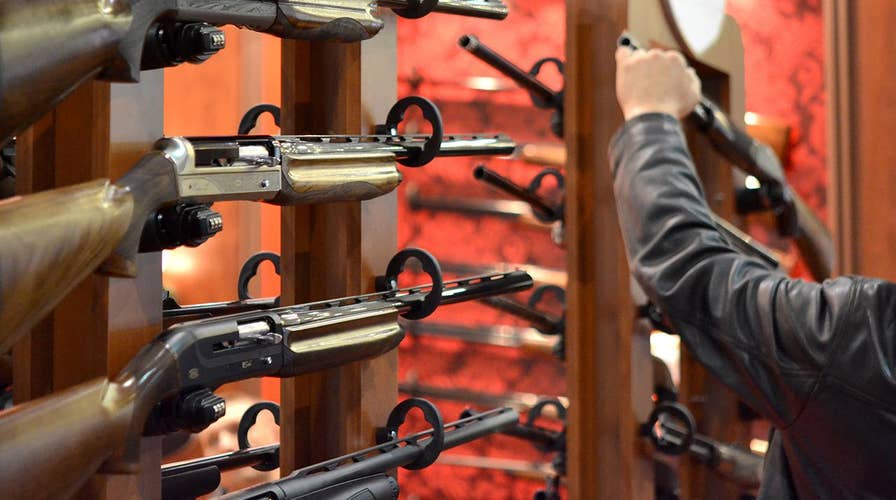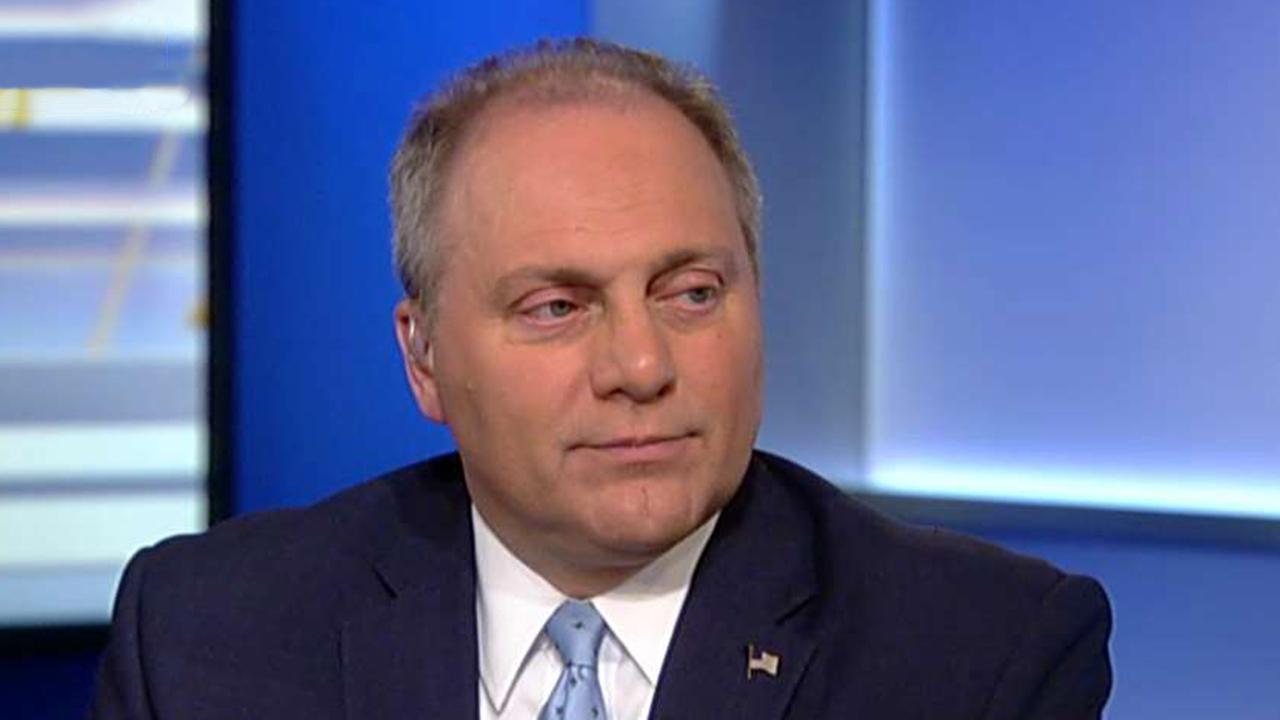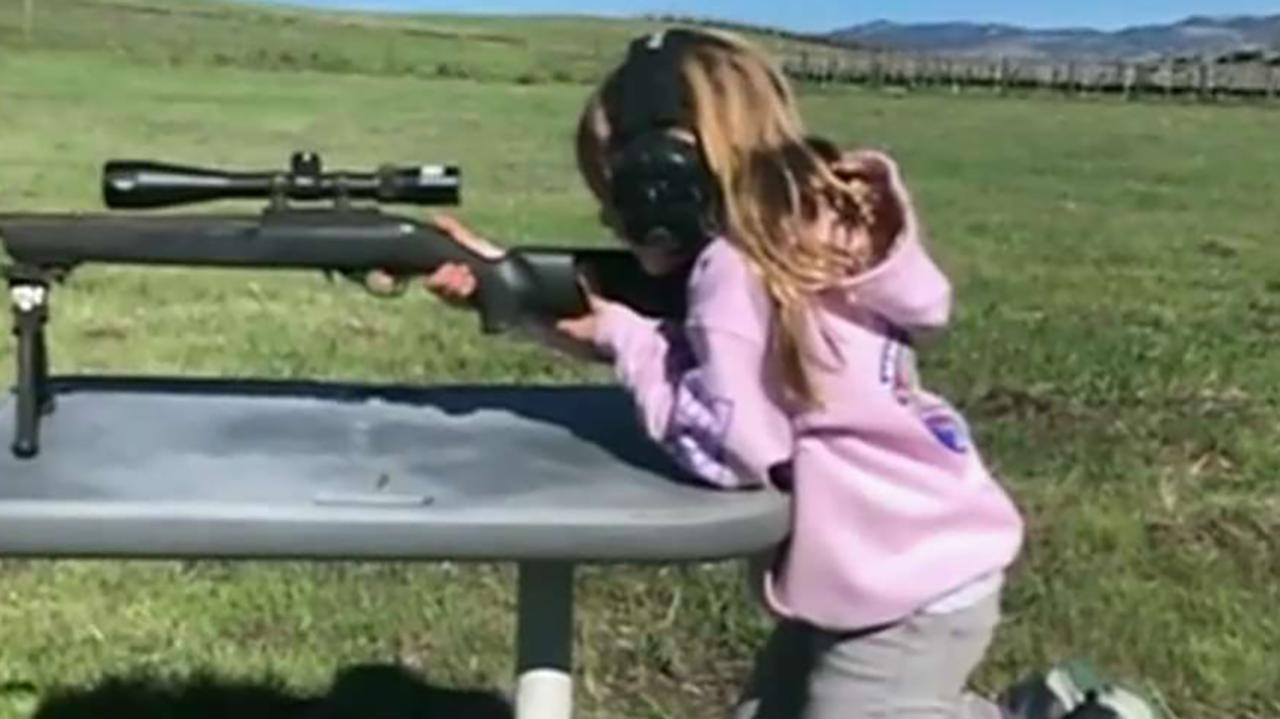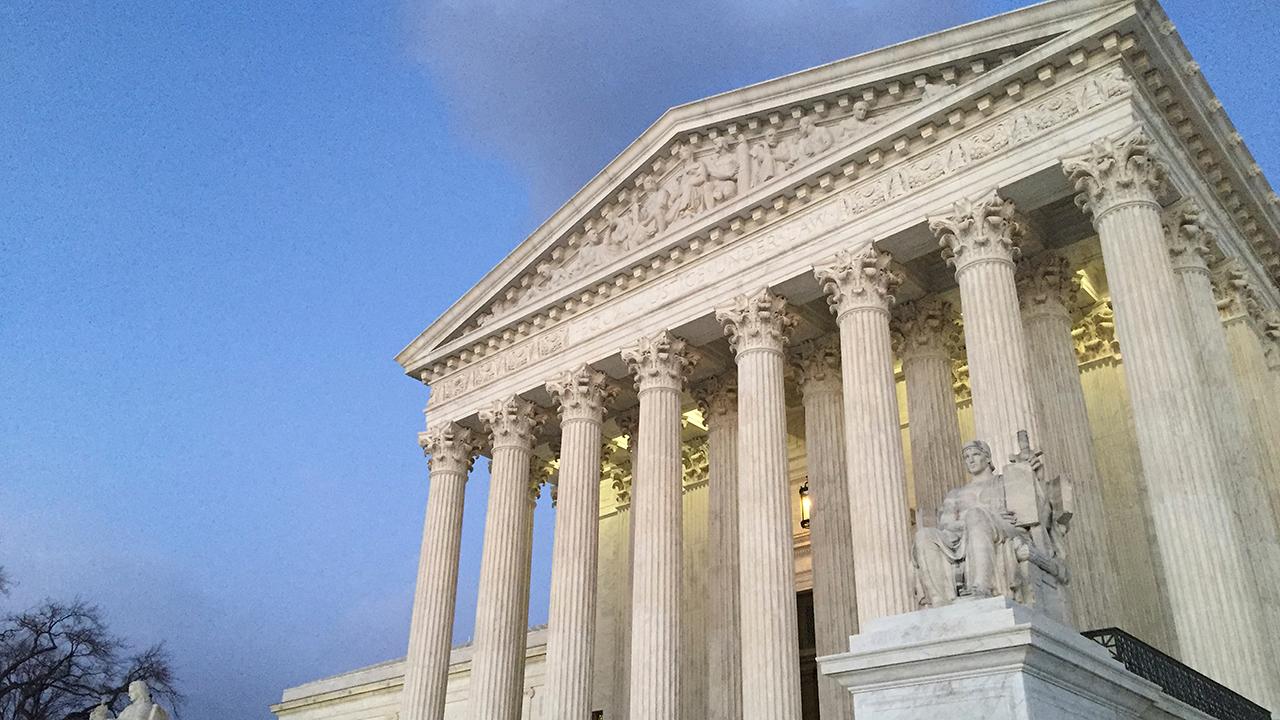Courts are issuing an unprecedented number of orders to seize firearms from people they deem to be mentally ill or threats to others, following a rash of state-level legislation aimed at curbing mass shootings across the country.
Even as conservatives sound the alarm about potential Second Amendment violations, supporters -- sometimes across party lines -- say these "red flag" laws are among the most promising tools to reduce the nearly 40,000 suicides and homicides by firearm each year in the country.
“I think we’re seeing a building consensus in blue states and red states that this is a good way to balance public safety against people’s Second Amendment rights,” Jaron Lindbaum, a representative of the activist grop Washington Ceasefire, told Fox News.
Nine states have passed laws over the past year allowing police or household members to seek court orders requiring people deemed threatening to temporarily surrender their guns, bringing the total to 14. Several more are likely to follow in the months ahead.
More than 1,700 orders allowing guns to be seized for weeks, months or up to a year were issued in 2018 by the courts after they determined the individuals were a threat to themselves or others. The actual number is probably much higher since the data was incomplete and didn't include California, where newly-installed Democratic Gov. Gavin Newsom has moved swiftly to curtail gun rights.
MORE THAN 450 PEOPLE IN FLORIDA REQUIRED TO GIVE UP GUNS UNDER NEW LAW
In his first few weeks in office, Newsom has quickly moved to reduce the number of Californians with firearms and given activists hope that a number of measures vetoed by former Gov. Jerry Brown will once again see the light of day.
“We have all the ingredients we need to make meaningful change,” state Assemblyman Jesse Gabriel said Monday at a press conference in Sacramento. “We have expanded Democratic majority in both houses. We have a bright and ambitious new governor with a real track record on this issue who wants to make this a priority.”
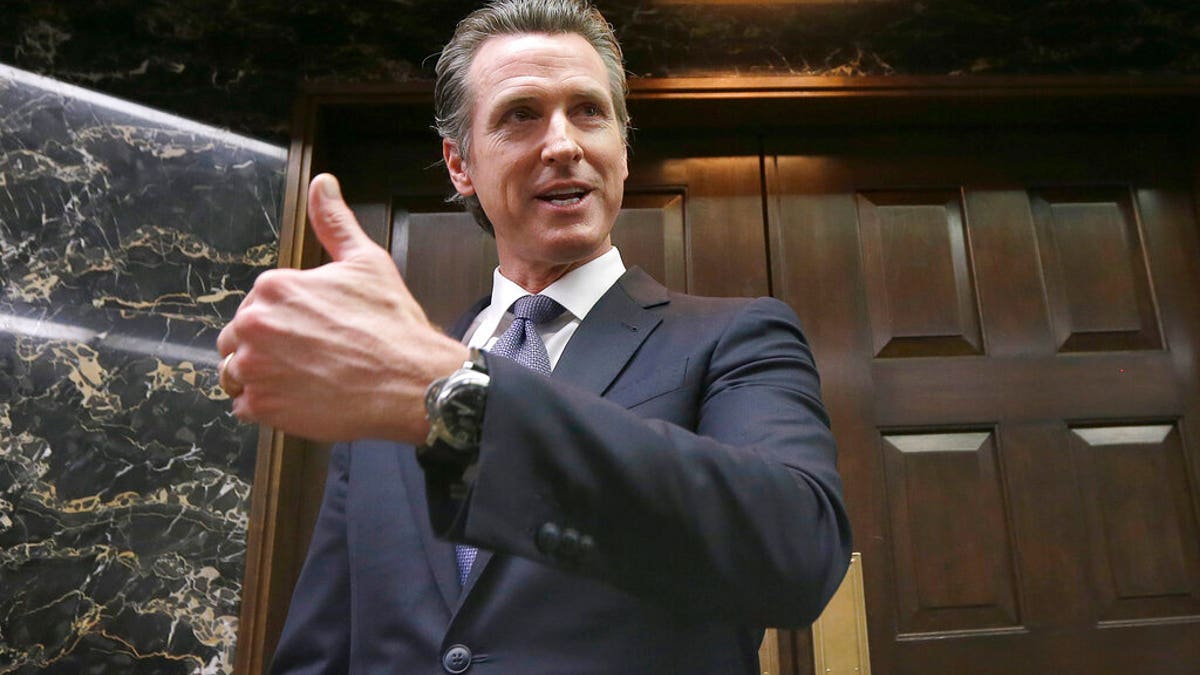
FILE - California Gov. Gavin Newsom in Sacramento, Calif. Newsom has already moved swiftly to enact anti-gun measures since taking office in January.
In his state budget plan, which was released just days after he took office in January, Newsom proposed an additional $5.6 million in funding – about 50 percent more than Brown allocated in his last budget – to seize firearms from the thousands of people who are ineligible to be gun owners because of past criminal convictions or mental illness. The gun seizure program has been underfunded in the past, with the result being that around 10,000 people in the state were able to purchase firearms, but later were convicted of a felony or found to have a serious mental illness.
Newsom also wants state lawmakers to expand a California Department of Justice unit tasked with enforcing gun sale laws and, in his proposed budget, has asked for more funding for the Firearms Violence Research Center at the University of California, Davis.
SECOND AMENDMENT SUPPORTERS REJOICE AS SUPREME COURT AGREES TO HEAR CRITICAL CASE
In his inauguration speech, Newsom promised to be tough on “a gun lobby willing to sacrifice the lives of our children to line their pockets.”
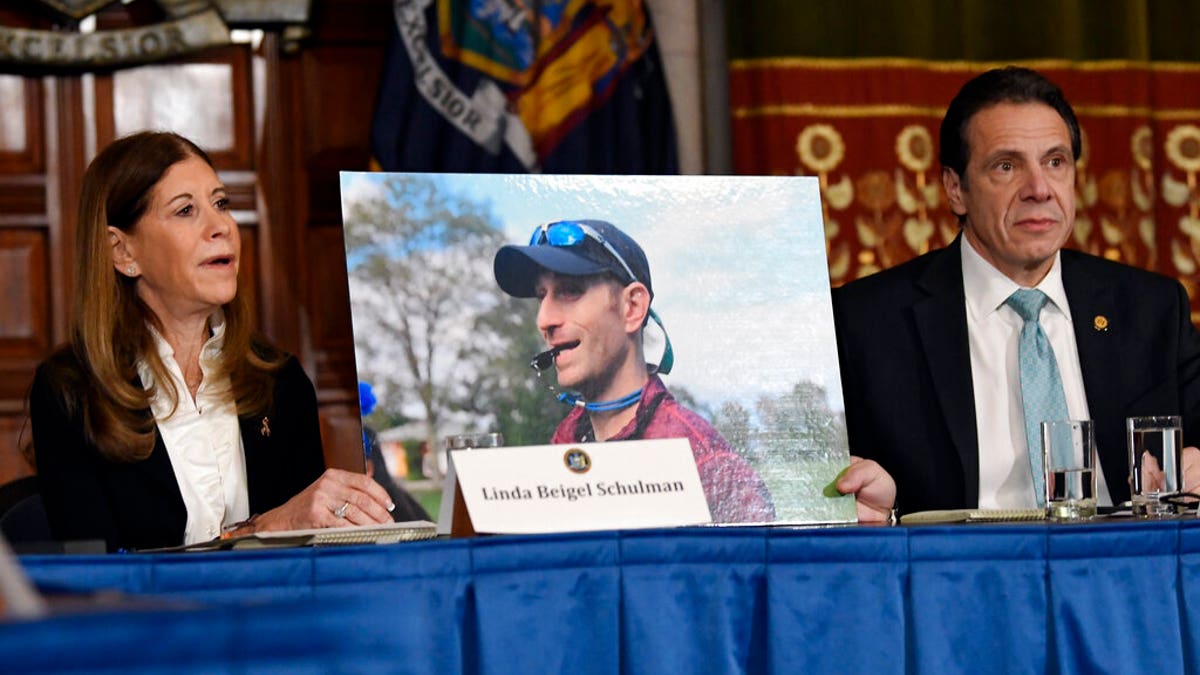
FILE - In this Tuesday, Jan. 29, 2019, file photo, Linda Beigel Schulman, left, holds a photograph of her son Scott Beigel, who was killed during the Valentine’s Day massacre at Marjory Stoneman Douglas High School, while speaking with New York Gov. Andrew Cuomo and gun safety advocates during a news conference at the state Capitol in Albany, N.Y. Since the shooting, states have seen a surge of interest in laws intended to make it easier to disarm people who show signs of being violent or suicidal. (AP Photo/Hans Pennink, File)
Since the beginning of the year, California state legislators have already introduced measures to put a 10-year firearm prohibition on anyone convicted of two drug or alcohol crimes in a three-year period, requiring gun owners to lock up their weapons when they are not home, and a tax on gun sales that would help fund violence prevention programs.
A bill that would permit more people to seek a gun violence restraining order against someone they believe poses a danger to themselves or others has also been reintroduced. It was previously vetoed by Brown.
The gun-seizure laws gained momentum nationally after it was learned that Nikolas Cruz, the young man accused in the 2018 Valentine's Day attack at Marjory Stoneman Douglas High School in Parkland, Fla., was widely known to be mentally troubled yet had access to weapons, including the assault-style rifle used to kill 17 students and staff members.
"Parkland would never have happened if Florida had a red flag law," Linda Beigel Schulman said during a recent news conference with New York Gov. Andrew Cuomo, who is expected to sign his state's new law any day. Her son, Scott Beigel, was a teacher and coach killed during the Parkland attack.
CALIF. GOV MAKES NEW GUN CRACKDOWN PUSH
Florida passed a red flag law as part of a gun-control package in the wake of the shooting. Aside from New York, Delaware, Illinois, Maryland, Massachusetts, New Jersey, Rhode Island and Vermont also have adopted variations since then. California, Connecticut, Indiana, Oregon and Washington already had similar laws.
Several states are debating them this year, including New Mexico, where two students were killed in a school shooting in December 2017.
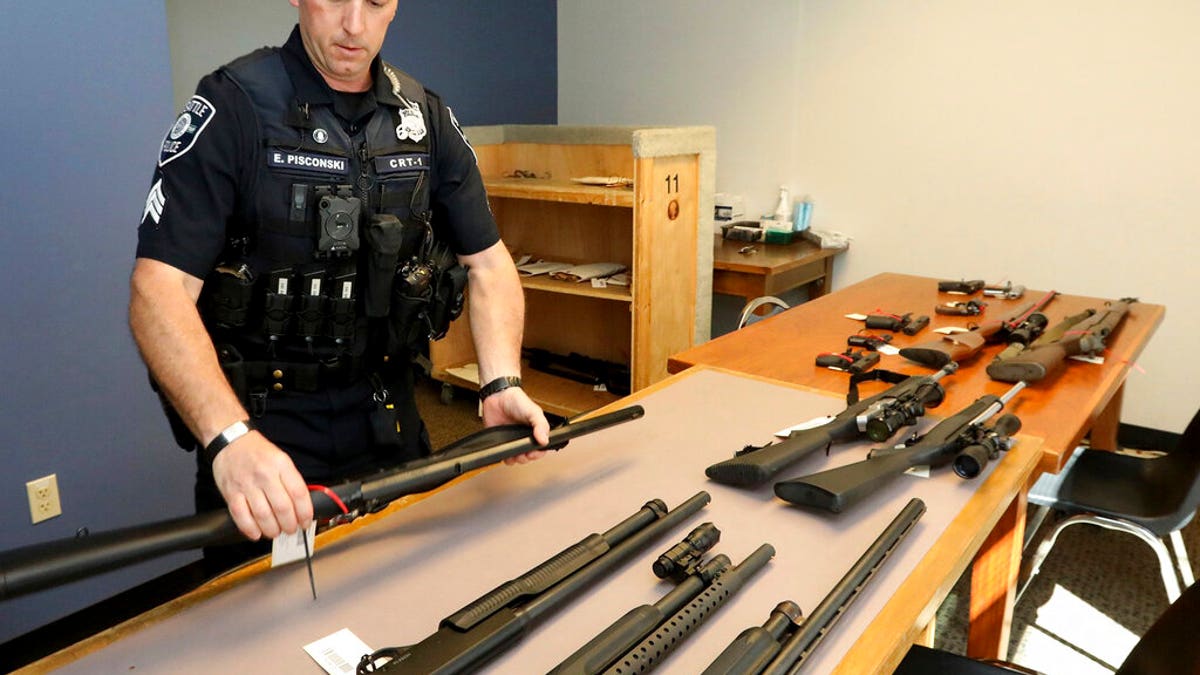
In this May 23, 2018, photo, Seattle Police Crisis Response Team Sgt. Eric Pisconski displays guns seized from people deemed to be a danger to themselves or others. Since last year's mass shooting at a Florida high school, states have seen a surge of interest in laws intended to make it easier to disarm people who show signs of being violent or suicidal. Washington voters approved such a law overwhelmingly in 2016. (Greg Gilbert/The Seattle Times via AP)
The laws are being invoked frequently in many of the states that have them.
Authorities in Maryland granted more than 300 petitions to temporarily disarm individuals in the three months after the state's law went into effect Oct. 1. Montgomery County Sheriff Darren Popkin said the cases included four "significant" threats of school shootings, and that a majority of the people who were subjects of the orders were suffering from mental health crises.
"These orders are not only being issued appropriately, they are saving lives," Popkin told lawmakers last month.
In Vermont, a prosecutor obtained an order to strip gun rights from a teenager released from jail after being accused of plotting a school shooting.
Florida courts granted more than 1,000 orders in the first nine months of its new law. Broward County, which includes Parkland, has been at the forefront, accounting for roughly 15 percent of cases statewide.
Among the first people subjected to the law was Cruz's younger brother, who authorities said was showing signs of violence after allegedly trespassing at the high school after the shooting. In another case, Florida authorities took dozens of firearms from a bailiff accused of threatening other courthouse employees.
Connecticut has the nation's longest-standing red flag law, which went into effect in 1999 after a mass shooting at the state lottery office. Authorities there say new awareness of the law contributed to a spike in 2018 in warrants issued to take away weapons — 268, the highest total on record, according to court data.
The rise reflects the more aggressive posture police have adopted since the 2012 mass shooting at Sandy Hook Elementary School in Newtown and other attacks.
One study found that the Connecticut law reduced gun suicides by more than 10 percent in recent years and that a similar law in Indiana led to a 7.5 percent drop.
"It really gives us a unique opportunity as prosecutors to come in before the violence has occurred. Often we are tackling it on the other side," said Kimberly Wyatt, a prosecutor in King County, Washington, who has been seeking one or two such orders per week in and around Seattle.
She said authorities use the best available research and their judgment, looking at whether a person has talked about suicide, threatened others, stalked someone or shown signs of a mental health crisis.
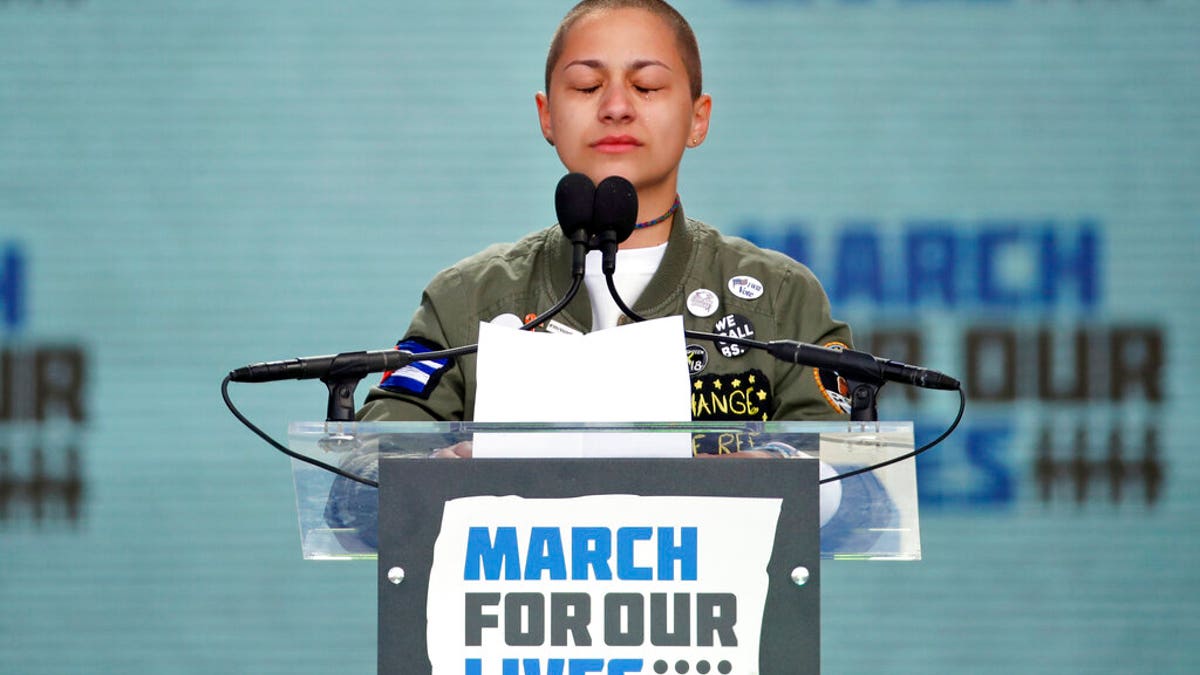
FILE - In this March 24, 2018 file photo, Emma Gonzalez, a survivor of the mass shooting at Marjory Stoneman Douglas High School in Parkland, Fla., closes her eyes and cries as she stands silently at the podium for the amount of time it took the Parkland shooter to go on his killing spree during the "March for Our Lives" rally in support of gun control in Washington. Last year’s shooting at a Florida high school sparked a movement among a younger generation angered by gun violence and set the stage for a significant shift in America’s gun politics. (AP Photo/Alex Brandon)
Gun-rights advocates argue that the laws can be used unfairly based on unproven accusations.
"In today's society, the police are going to err on the side of caution. The threshold for issuing these types of warrants has been lowered," lamented Scott Wilson Sr., president of the Connecticut Citizens Defense League.
Debates in state legislatures often turn on how much due process gun owners should receive and who can petition for the orders. In some states, only police can file the petitions. Other states allow members of the person's household, relatives, school officials, employers and health care providers to do so.
Most states allow for temporary orders that are issued for days or weeks. Judges then hold hearings to decide whether to extend them for up to one year.
During the debate in New Mexico, Army veteran Rico Giron testified that people could see their guns seized over grudges between family members or neighbors.
"It's incredibly dangerous because it opens the door for vindictiveness and revenge," Giron said.
The bill's sponsor, Democratic Rep. Daymon Ely, said he wants parents to have another option if they have a child suffering from mental illness.
"The state has an obligation to say, 'Yes, there is something we can do for you,'" Ely said.
Fox News' Dan Springer, Andrew O'Reilly, and The Associated Press contributed to this report.








































